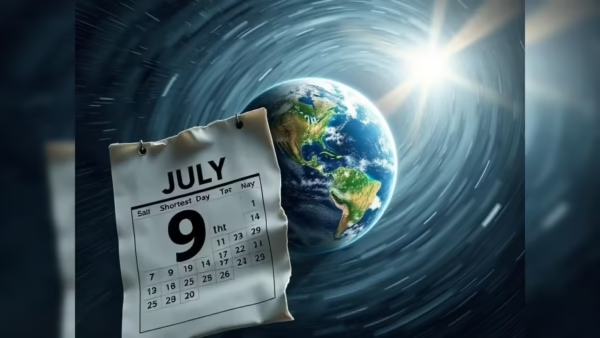July 9, 2025, became the shortest day in recorded history. Discover what caused this rare event and what it means for Earth’s future.

July 9, 2025 – The Day Time Moved Faster Than Ever ⏳🌍
Something strange happened on July 9, 2025.
The Earth spun a little faster than usual.
So fast, in fact, that the day became the shortest in recorded history.
That means we lost about 1.3 to 1.6 milliseconds of our day.
It may not sound like much.
But in science and timekeeping, even a millisecond matters.
What Really Happened?
Normally, Earth takes 24 hours to complete one full spin.
But on July 9, it did it a tiny bit faster.
This rare event was picked up by atomic clocks and space observatories.
So why did it happen?
Scientists believe it has to do with the Moon’s position, the Earth’s inner core movements, and even seasonal changes.
Others suggest it may be linked to climate shifts or changes in glacial weight around the planet.
You may also like our blog:
👉 Secrets from the Void – 3I Atlas Enters Our Solar System
Is This Dangerous?
No, there’s no danger to us.
We didn’t feel anything.
Our phones, watches, and computers all worked normally.
But for scientists, it’s a big deal.
Time is tightly measured—especially for satellites, GPS, and global communication.
A shift like this can cause tiny glitches.
It’s also a reminder that Earth isn’t perfect or constant.
It changes. It spins. It shifts. And sometimes—it surprises us.
What Could This Mean for the Future?
Some experts say we may soon need to add a “negative leap second.”
That means shortening a day slightly to keep atomic time and solar time in sync.
This has never been done before.
In the past, we’ve only added time—never taken it away.
It’s a new challenge for scientists and timekeepers around the world.
Read more world-impacting news on www.america112.com
The Earth Is Changing—Fast 🌐🌡️
This event adds to a long list of unusual planetary changes.
From increasing temperatures to shifting seasons, our planet is evolving quickly.
For instance, we recently explored why Europe is experiencing extreme heat waves.
👉 Why Europe Is So Hot Right Now
Everything is connected.
As ice melts and ocean currents shift, even the Earth’s spin can be affected.
It’s a fascinating, mysterious, and urgent time in Earth’s story.
Final Thoughts
The shortest day in history came and went quietly.
No fireworks. No warnings. Just a quick spin.
But it reminds us how fragile and powerful our planet really is.
Time may be ticking a little faster, but so are the changes around us.
Let’s stay curious. Let’s stay informed.
For more mysteries of space and science, visit Recital Blog
And for breaking world news, follow www.america112.com

